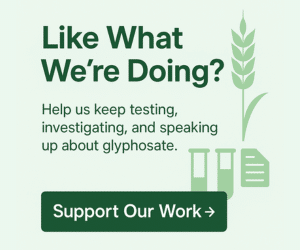A recent Nature Communications Biology study (2025) delivered a jaw-dropping statistic: one in four infants in the United States entirely lacks Bifidobacterium in their gut microbiome.
These beneficial bacteria are vital in the early stages of life, helping to digest human milk oligosaccharides, train the immune system, and protect against inflammation and infection.
The absence of these foundational microbes in so many babies raises an urgent question: what’s driving this large-scale microbial collapse?
The researchers pointed to factors such as C-section birth, formula feeding, and antibiotic exposure — all known to disrupt gut colonization. But is that the whole story?
At No More Glyphosate NZ, we believe another suspect deserves closer examination: glyphosate.
You can read the full study in Nature Communications Biology.
Glyphosate: From Pipe Descaler to Antimicrobial
Glyphosate was first patented in 1964 as a metal chelator and industrial descaling agent — essentially for cleaning out mineral buildup in pipes. Later, it became famous as an herbicide, and even more recently, its antimicrobial properties were recognized and patented for controlling bacteria in humans and animals.
Studies have shown that glyphosate can selectively inhibit beneficial gut bacteria, including Bifidobacterium, while leaving some potentially harmful bacteria less affected or even enriched.
Glyphosate residues have been detected in some studies of breastmilk, as well as in food and water. Given infants’ vulnerability and the crucial role of a balanced gut microbiome in early life, the possibility that glyphosate exposure could further disrupt Bifidobacterium populations cannot be ignored.
One in four babies missing key gut microbes should ring alarm bells. Could chemical exposures be playing a role?
Connecting the Dots
Although the Nature study did not directly examine glyphosate, the overlap is difficult to dismiss. Infants today are growing up in an environment saturated with pesticide residues. Their tiny bodies — and developing microbiomes — are uniquely susceptible to chemical exposures that older children or adults might tolerate more robustly.
When you combine:
- a chemical first patented to break down minerals, now recognized as an antimicrobial
- documented detection in breastmilk, food, and water
- mounting evidence of microbial disruption
- and now, data showing a quarter of U.S. babies missing Bifidobacterium
…it seems only reasonable to ask whether glyphosate could be a hidden factor undermining infant gut health on a population scale.
Where to Next?
This is not about alarmism — it’s about asking better questions. We urgently need transparent, independent research into how low-level glyphosate exposure might affect the microbiomes of babies, from the womb through breastfeeding and solid food introduction.
Because if the earliest building blocks of lifelong health — our gut microbes — are being quietly dismantled by a chemical once billed as “safe,” we have a public health time bomb on our hands.
At minimum, parents deserve the right to choose foods and environments free from glyphosate contamination. Until regulators and policymakers catch up — and New Zealand still lacks any testing for glyphosate residues in breastmilk or infant urine — that may be the only way to protect our children’s missing microbes, and safeguard their healthy start in life.
Bifidobacterium is foundational to an infant’s microbiome — and glyphosate is a patented antimicrobial. Are we connecting the dots?
Further Reading
The story of missing microbes is far from simple. Beneath the headlines about antibiotic use and C-sections lies a deeper, more uncomfortable question: could our chemical environment — including glyphosate — be quietly reshaping babies’ gut health before they even have a chance to thrive? These resources will help you explore the science, the uncertainties, and the urgent need to protect the earliest building blocks of health.
Population-wide loss of bifidobacterial communities in U.S. infants
Nature Communications Biology (2025)
This groundbreaking study found that 25% of U.S. infants had no detectable Bifidobacterium, raising urgent questions about the modern infant microbiome.
https://www.nature.com/articles/s42003-025-08274-7
The Effect of Glyphosate on Potential Pathogens and Beneficial Members of Poultry Microbiota In Vitro
Shehata et al. (2013)
This study showed glyphosate’s selective antimicrobial activity, suppressing beneficial bacteria like Bifidobacteria while leaving certain pathogens less affected.
https://link.springer.com/article/10.1007/s00284-012-0277-2
Facts and Fallacies in the Debate on Glyphosate Toxicity
Mesnage & Antoniou (2017)
A thorough scientific review of glyphosate’s antimicrobial effects and its potential to disrupt gut microbiota.
https://www.frontiersin.org/articles/10.3389/fpubh.2017.00316/full
Glyphosate Found in Breast Milk
Moms Across America (2014)
Though controversial, this early pilot testing claimed glyphosate residues were present in breastmilk, igniting calls for further investigation.
https://www.momsacrossamerica.com/glyphosate_testing_results
Conclusion on the peer review of the pesticide risk assessment of the active substance glyphosate
EFSA (2015)
The European Food Safety Authority’s official review of glyphosate safety, often cited by regulators, though it does not explore microbiome impacts in infants.
https://www.efsa.europa.eu/en/efsajournal/pub/4302
Gut Check: What Glyphosate Is Doing to Your Microbiome
A deep dive into how glyphosate may alter gut bacteria, weaken the intestinal barrier and contribute to wider health effects regulators rarely acknowledge.
https://nomoreglyphosate.nz/glyphosate-microbiome-impact/
Gut health begins long before solid food, yet modern babies may be starting life with a microbiome already under siege. As you explore these sources, consider this: if the most widely used weedkiller on Earth can suppress beneficial bacteria, what does that mean for the next generation’s resilience? The conversation is just beginning — and so is our responsibility to demand better answers.
Image Source & Attribution
We’re grateful to the talented photographers and designers whose work enhances our content. The feature image on this page is by SvetlanaFedoseeva.




